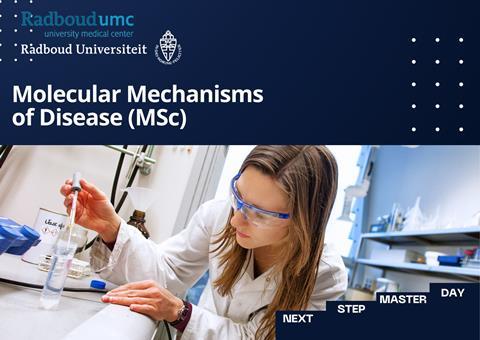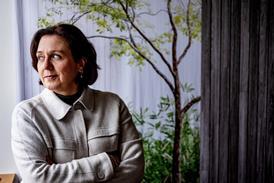
Small-scale teaching, personal coaching and a strong focus on acquiring scientific skills. These are reasons why current students would recommend the Master’s programme in Molecular Mechanisms of Disease (MMD). The programme was designed to use all the resources available to prepare students for a career in molecular cell biology. Students acquire theoretical knowledge, but also learn presentation skills, writing a research proposal or a scientific article.
Each year, up to 24 students start with the 2-year Master’s programme. Typically, the student group is made up of 10 or more nationalities, and all students share a strong ambition to become a professional in the life sciences field. The small group size ensures there is high interaction with the lecturers, who are all researchers of the Radboud university medical center.
Every student has a personal mentor, with whom they can discuss their individual choices for elective courses and internships. This mentor is an experienced researcher from the Radboudumc, who can be a role model for the student. Additionally, we stimulate students to focus on their own personal and professional development, by offering peer review sessions in which they are encouraged to review their problem solving and work methods.
Masterclasses
An excellent example of the group-oriented education in MMD are the masterclasses. These 1-week courses are organized twice a year. We invite international researchers to talk about their work on a specific topic. Students gain in-depth knowledge about cutting-edge research and actively participate in the course by presenting papers written by the guest lecturers in journal clubs and hosting seminars for the entire research institute. In recent years, topics of masterclasses included ‘Vector-borne viral diseases’ and ‘Glycans in onco-immunology’.
Internships
MMD students are obligated to do 2 internships, during which they will perform their own research project. In the first year, students join a research group at the Radboudumc, and in their second year we strongly encourage students to go abroad. To find an internship abroad, students make use of the network of Radboudumc researchers or MMD alumni. During these internships, students discover the day-to-day tasks of a researcher and develop scientific skills such as planning and analyzing experiments, writing a scientific article about their results and presenting their results to the research group.
Career perspectives
Most MMD students choose to continue in academic research as a PhD candidate at the Radboudumc, another university in the Netherlands or abroad. But the scientific skillset obtained through this research’s Masters also prepares students for a career outside academia, e.g. in management, scientific publishing or as patent attorney. The close network of MMD alumni gives students the opportunity to connect with professionals in different stages of their career and various fields of work.
More information
In this video the programme director and a current student give an introduction to the programme:
For an complete overview of the programme and to apply, go to Research Master Molecular Mechanisms of Disease | Radboud University (ru.nl)
Find us during the Next Step Master Day on the 27th of February 2024!
Next Step Master Day
The Royal Netherlands Chemical Society (KNCV) and the Landelijk Overleg Biologie Studenten (LOBS) are joining forces to help you prepare for your future. The Next Step Master Day offers a unique opportunity to explore over 65 master programs from all across the Netherlands. Spanning from biology to chemistry, from research to science communication and policy - all in a single afternoon.
Mark your calendar for February 27th, from 15:30 – 20:00h, at Utrecht Science Park.
Beyond the master program market, you can visit a Q&A session featuring graduate students who have undertaken internships abroad.
Are you ready for your next step? Make sure not to miss the Next Step Master Day!
Visit www.nextstepmasterday.nl for more information and secure your spot. Your future awaits!














